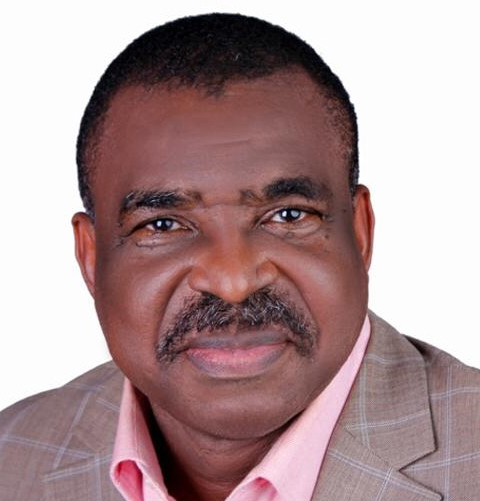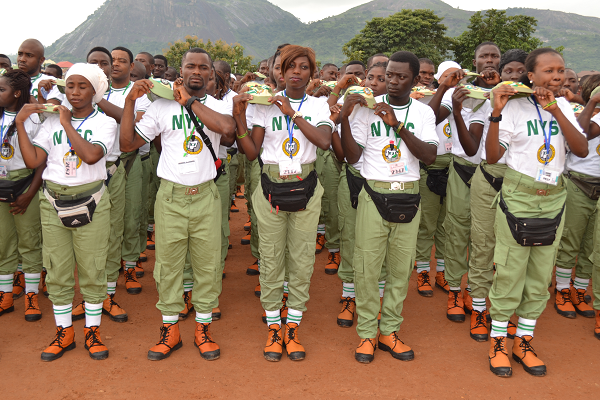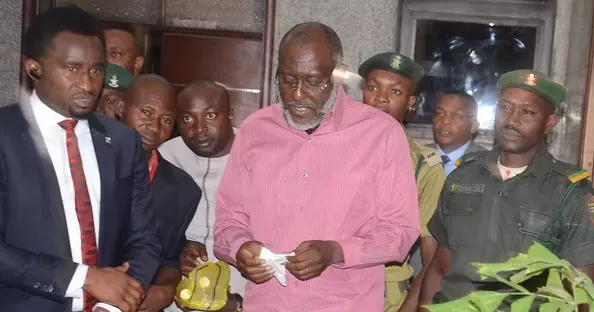These are perilous times for President Muhammadu Buhari and the 36 state governors of Nigeria.
In fact some would argue that this is not a good time to be president or governor in Nigeria.
Already, about twenty seven, 27 of the states are said to be so insolvent, that the governor’s are unable to pay civil servants their monthly emoluments without assistance from the federal govt.
The burden is even more severe on the seven,7 active crude oil producing state governors who are now facing the risk of having oil installations in their domain vandalized by Niger Delta Avengers – an apparent offshoot of the dreaded MEND and such other environment rights or criminal elements now holding sway in the Niger Delta.
Advertisement
For the sake of the clarity of the issues at hand,lets use Delta state and governor, Ifeanyi Okowa, in whose domain ,the militants recently attacked oil installations as example.
With the resurgent militants destroying oil production and transportation facilities – Forcados crude oil pipeline linking export terminal operated by Shell and a rig owned by Chevron- twice in two weeks, Delta state is now groaning in pains and the governor is practically traumatized.
This is because owing to the substantial loss of estimated 300,000 barrels of oil per day, due to the damaged oil infrastructure ,Delta state will suffer reduced monthly revenue allocation from the Federation Account, FAAC.
Advertisement
Essentially ,the amount of money received as Delta state’s portion of the thirteen, 13% derivation fund, is determined by the volume of oil pumped into the central reserve for export from the facilities located in the domain of the various oil producing states.
Although Delta state is populated by about five, 5 million people, it has a huge wage bill of about N8b.
l’m told that since the oil price slump, the state govt has been receiving a little more or less than N6b from the federation account, FAAC which is a shortfall of about N2b needed to settle workers salaries monthly.
What that means is that,workers emoluments are augmented with Internally Generated Revenue , IGR which is also a paltry N2-3b due to slow down in business activities.
Advertisement
With two major oil facilities damaged and volume of oil which Delta state contributes into the national pool is now shorter by at least 300,000 mpd.
So the amount received from FAAC will drop further and that implies more financial headaches.
In Okowa’s world, worker’s salary is considered priority, because as a grassroots politician, who anchors his political power on workers and the masses ,the govt takes workers welfare seriously.
Invariably, after paying workers, there is little or nothing left to fund development initiatives,hence those close to governor Okowa say, he is usually moody towards the end of month, as he loathes to fail in meeting workers expectations.
Advertisement
The scenario in delta state described above ,applies particularly to all the oil/gas producing states and generally to all the states in Nigeria – from Abia to Zamfara because they are all practically sustained by oil revenue which accounts for about 70% of national income and 90% of nation’s FX income.
The ugly situation in delta state has even been further compounded by news from Shell -the biggest oil exploration firm in Nigeria-which has also just declared force majeure in one of her facilities , citing vandalism as reason for shutting in another 200,000bpd.
Advertisement
According to statistics from Nigerian National Petroleum Corporation, NNPC, it recorded a scandalous 3,153 punctured points on its oil pipelines in 12 months, ending March.
As a result of losses sustained from such vandalism ,the NNPC suffered operating deficits in excess of twenty four billion naira, 24b in February and over eighteen billion, 18b in March.
Advertisement
Consequently, Nigeria is unable to meet her OPEC allotted quota of 2.3mbpd.
In fact, right now, Nigeria is struggling to export less than 1.8mbpd largely due to forced shut downs etc.
Advertisement
This is a clear five million barrels, 5m short of the badly needed crude export to generate income in order to replenish our fast depleting fx reserve.
In a recent interview with the chief executive officer of Shell Petroleum and Development Company, SPDC, in Nigeria, Osagie Osunbor, he revealed that in 2014, theft of crude oil from SPDC pipelines was 37,000 barrel per day. It dropped to 25,000 in 2015, in part due to sale of some of the facilities to indigenous investors and the SPDC boss further disclosed that the number of attacks also dropped from 139 in 2014 to 93 in 2015, but nonetheless, theft and sabotage still constitute about 85% of spills from SPDC pipelines.
Ibe Kachikwu,Petroleum minister of state, who also doubles as GMD of NNPC, says Nigeria’s oil production is down by about 40% due to renewed militancy in the Niger Delta.
When you add the debilitating effects of such horrendous vandalism induced losses to the tumbling crude oil price in the international market,then you can vividly see the reason there is palpable apprehension about the looming insurgency of militants that could further exacerbate an already complex and precarious situation in the Niger Delta zones in particular and which is bad news for Nigerians, as a whole.
What the scenario above illustrates, is that starting from governors who are assumed to be enjoying in Gov’s mansions to the ordinary man who is hamstrung by dearth of infrastructure like roads, hospitals , pipe borne water, and schools,the threat or actual vandalization of oil assets results in more heartache.
Worse still, similar types of losses in the oil/gas sector apply to electricity, telephone and water/dam infrastructure which were being consistently damaged or under threat at the peak of Boko haram terrorist attacks in north eastern parts of Nigeria.
The destruction of communication and electricity infrastructure by terrorists was ostensibly to prevent remote communities under attack from calling security agencies for help, but thank God the terrorists did not turn their gaze to water reservoirs and dams as targets for poisoning.
Considering the recent attempt in Kenya to poison a water reservoir by using anthrax by the terrorist group,Al Shabab,the need to protect public water installations in Nigeria,which are core parts of critical national assets,can’t be over emphasized.
Viewed from the prism of the colossal amount of money and lives lost to vandalism related activities catalogued above,it goes without saying that govt should seek for enduring ways and means of protecting critical national assets such as the ones identified as being under threat.
I needed to project how very important the safety of our critical national assets are to every Nigerian by highlighting the adverse effects that damages on them are having,and would continue to have on revenue generation for the benefit of all Nigerians, so that every body would be on the same page about the dire need for the establishment of assets protection corps,being proposed in this article.
Already, President Buhari and Vice President Yemi Osinbajo, in the course of their campaign for office last year, promised that the federal federal govt would recruit 500,000 unemployed graduates into the teaching profession to create employment and also boost education, which is good.
Another opportunity to create 1,000,000 jobs for youths through the establishment of critical national asset protection corps is knocking on the door now.
Here is the deal:
Currently, there are a plethora of youths centric outfits such as the National Youth Service Corps, NYSC set up way back in 1978, as a national integration forum for Nigerian youths.
There is also the National Security and Civil Defense Corp, NSCDC, which is an unarmed paramilitary agency set up to ensure public order, just as there is Federal Road Safety Corps, FRSC focused on safety on Nigerian roads.
So there already exists,a blue print for setting up such a youth focused organization and the requisite experience abound for its operation.
Considering that a recent advertisement for application into the Nigeria Police Force, NPF, attracted about one million youths even though only a few thousands were needed, the importance of creating more platforms to harness the productivity of these apparently idle but virile young men and women in their prime, for the growth and development of Nigeria, can not be over emphasized.
More so as they will be performing a fundamental task of filling the security gap which the lack of existing plans for the protection of critical national assets created, hence they have been unduly exposed to vandalism.
A couple of years ago,an advertisement by Nigerian immigration service, inviting youths for employment also attracted a record number of them, but due to lack of effective crowd control strategies, a number of youths who turned up in droves ,were unfortunately trampled to death during stampede.
What the two scenarios described above imply, is that, there already exists a workforce with latent energy,waiting to be harnessed as veritable human resources for the proposed Critical National Assets Protection Corp.
Just the youths abound, there is also a huge reservoir of men and women with military experience waiting to impart the knowledge to a new crop.
This is because over the past few years, Nigerian military has spent huge sums of money training members of the armed and other security forces at home and abroad. Owing to coups and counter coups,which were common at the nascent stage of Nigeria’s development,most of the military men trained in prestigious institutions in the United States of America, USA, Europe, lndia and Pakistan retired prematurely from service.
Their very robust training in security matters qualifies them as veritable pool of potential human resources developments that could drive the Critical National Assets Protection Corps initiative.
It goes without saying that the Corp members would only supervise licensed private security firms to be sourced from the various communities where the assets are located. That way,there would be a sense of ownership by the community and the current concept of relying on vigilante-rag tag army- would be eliminated.Ideally, there need not be vigilante groups like civilian, Joint Tax Force, JTF in the north, Odua People’s Congress, OPC in the south west and now return of Bakassi boys in the south east but in the absence of adequate protection by the military and police, citizens are left with no other option than to rely on such ad hoc measures which is reminiscent of what obtained in the USA before it became a confederation.
As they say, necessity is the mother of invention, so make no mistake about it, what is being proposed is not a novelty.
Before the development of the USA into a federations of states, each state had their own militia for protection, because there was no common army. That’s the origin of the freedom to bear arms-Stand Your Ground-by members of American societies who needed to protect their communities from outlaws like slave raiders and red Indians whom foreign invaders mainly from Europe had displaced from their land.
It is now left to the authorities to seize the opportunity to create another 1,000,000 jobs via critical national assets protection corps in addition to the 500,000 teachers soon to the recruited from the burgeoning number of unemployed youths in Nigeria.
The beauty of this proposal is that is its two for the price of one because, while govt would be providing one million, five hundred thousand jobs for the youths,instead of just five hundred thousand initially being proposed for recruitment as teachers, the nation’s critical assets, now susceptible to vandalism, would also be best safeguarded.
However, no matter how lofty the concept proposed above is, it can not happen except there is relative peace in the Niger delta which is currently brimming and boiling over with violence.
Govt has responded by threatening to unleash military force on Niger delta militants,similar to what was applied against Boko Haram terrorists.
Philip Hammond, British minister in charge of African affairs, on the sidelines of regional security meetings in Abuja last week, has urged president Buhari to address the grievances of Niger delta militants in a more holistic manner.
In his view ” Buhari has got to show as a president from the north that he is not ignoring the Niger delta, that he is engaging the challenges in the delta”.
With 70% cut in the budget for militants training in 2016 appropriation bill, mr Hammond believes the militants have legitimate concerns that need to be resolved amicably, as opposed to the military action being contemplated.
The fiery Muslim cleric, Sheik Gumi in a recent media interview, has also weighed in with his admonition.
“How can they deal with militants in the first place, when they are holding the nation’s umbilical cord? You are fighting Boko haram in the north, and you want to fight militants in creeks.You don’t fight on two fronts at the same time. That was one of the reasons why Adolf Hitler failed in in the Second World War.( And l dare add, the reason George W Bush and the GOP also lost power to the Democrats in the USA).
Sheik Gumi concluded that “The govt should sit down with them and ask them the reasons for their agitation”.
Allocation of some oil wells to state govts and indigenes of Niger Delta, is for instance, one of the demands, which l believe authorities may not be averse to if properly structured.
All the perspectives captured above boil down to govt’s inability to sort out the genuine grievances in a multi ethnic, and multi religious country. This is why we seem to be going round and round in vicious circles trading crime and violence from region to region, based on the cleavages and religious colorations of whoever is president in Nigeria.
Not until the authorities sort out the genuine political issues through diplomacy,can the aspect of criminality,be reined in with the critical national assets protection Corp.
Hence when a southerner is occupying Aso Rock, the north antagonizes and when a northerner is at the helm of affairs, the south also rankles the leadership.
What is therefore required to avoid the looming human catastrophe and economic paralysis is a combination of both diplomacy and security enforcement to restore peace in the Niger delta and thus save Nigeria the imminent calamity of vandalization of crude oil infrastructure that would compel cessation of crude oil export.
The ball is now in govt’s court.
Jobs Creation minister (Labour & Productivity?), Emeka Ngige and petroleum minister of state, Ibe Kachikwu, over to you.
Onyibe, a development strategist, is a former commissioner in Delta state and an alumnus of the Fletcher School of Law and Diplomacy, Tufts University, Medford, Massachusetts, USA.
Add a comment







